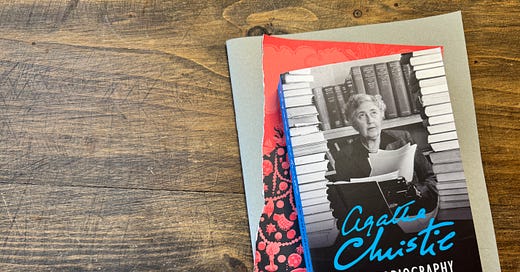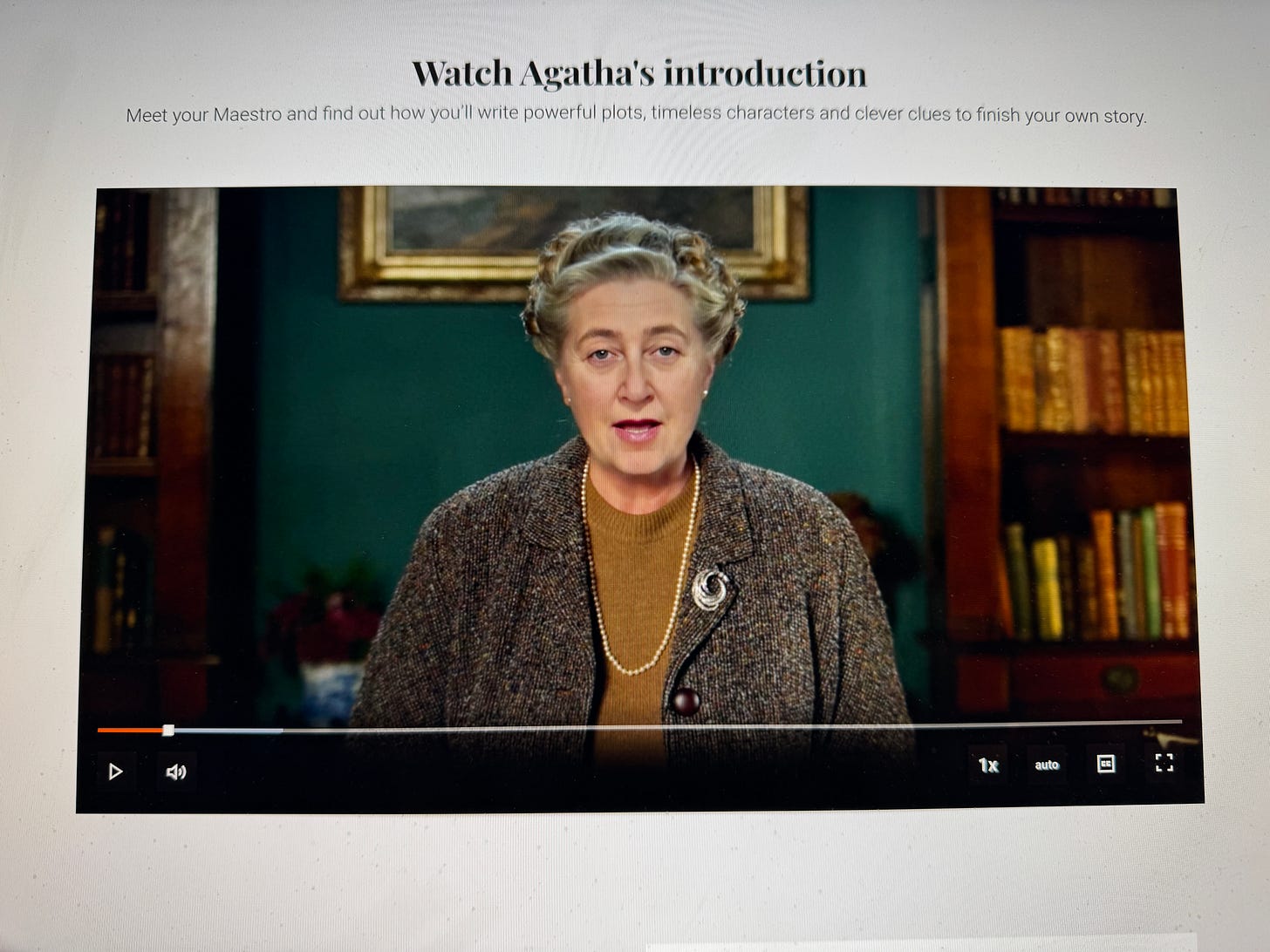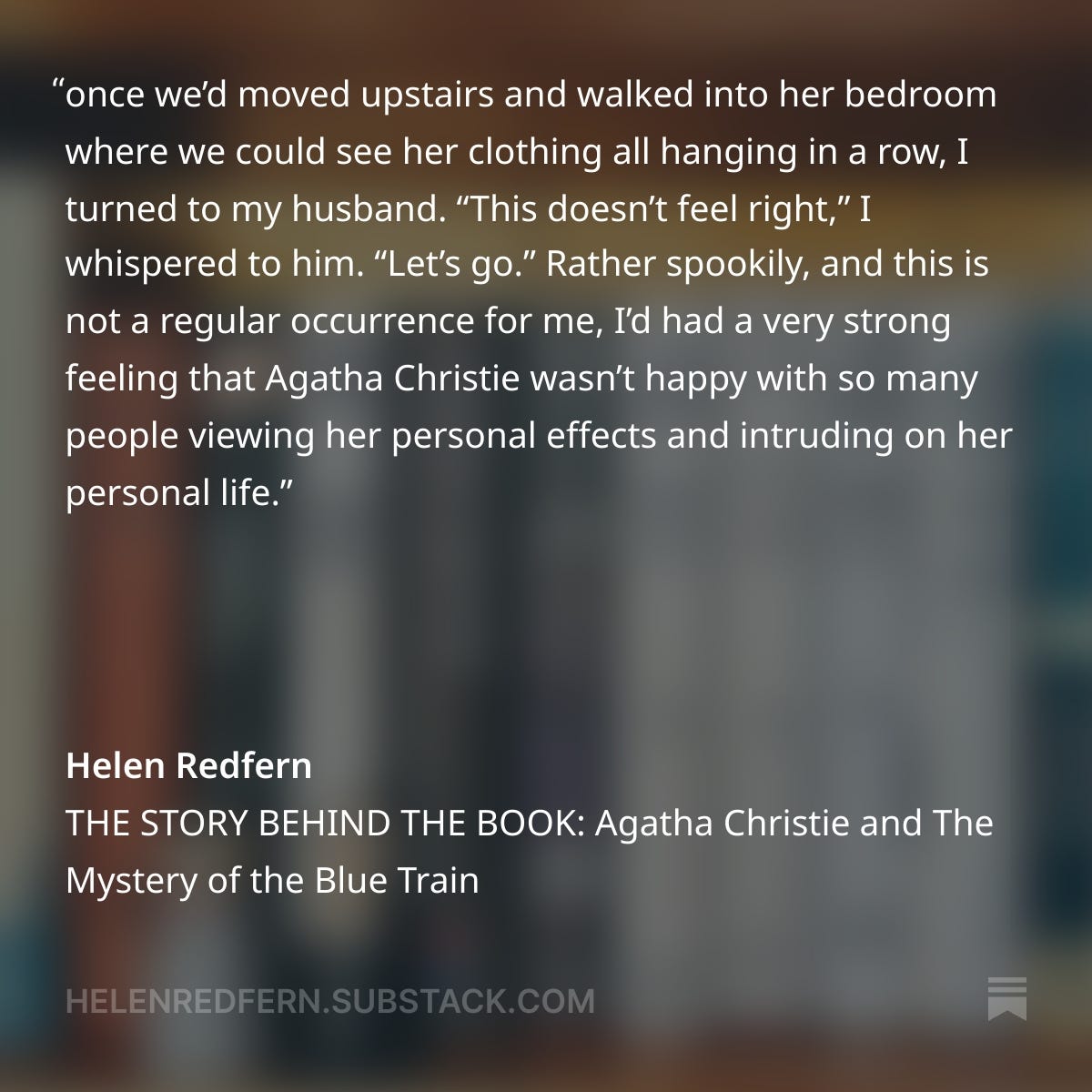Agatha Has Been AI-ed, and I Feel Uncomfortable About It
What are the ethics of bringing a long-dead author 'back to life'?
It’s been five days since this Note from
where she shared the link to my recent Agatha Christie essay:Frustratingly, Substack has truncated it, so here are Anna’s words in full:
“I love reading the words of those in my paid community on White Ink and I’m just catching up with this by Helen Redfern which is fascinating. I don’t know too much about Agatha Christie, though I did read the book that Lucy Worsley wrote, but how strange that Helen got the feeling she was a private person as she toured her home and saw her clothes on display. Makes me wonder even more about that BBC maestro course which has ‘brought her back to life’ and has ‘Agatha’ playing teacher. Made me feel really uncomfortable.”
This was the second time I’d heard about the BBC Maestro course with Agatha Christie, but I hadn’t yet had a chance to look into it.
BBC Maestro is a platform where you can learn from courses about all manner of topics. Jed Mercurio has a course on writing drama for television, Julia Donaldson has writing children's picture books, Jo Malone has one about thinking like an entrepreneur. There are songwriting ones, writing a musical, interior design, writing love stories with Jojo Moyes and so many more. I signed up to the Jed Mercurio one, which I was intending to do before my book proposal took over my life.
The latest writing course to be published by BBC Maestro with much fanfare in the media is by Agatha Christie. “But, isn’t she dead?” I hear you ask. Yes, indeed she is, died in 1976 in fact. But thanks to the wonder of modern technology, she has been resurrected, dressed, given a script and a voice, and she’s now teaching you writing through your computer.
According to The Bookseller, “The project, which uses artificial intelligence to bring a simulation of the Queen of Crime back to life, has had a mixed reception, lauded as wonderfully creative by some and ‘a bit Frankenstein’ by others.”
My personal response was, ick. From my recent research, I knew Agatha Christie was intensely private. She hated the publicity surrounding her disappearance and nervous breakdown, and she didn’t like standing up and doing speeches in front of people. I also know that, although Agatha Christie herself didn’t say certain things about the business of writing, the character of Ariadne Oliver, from the Poirot books, often said those thoughts for her.
The following two quotes give us an insight into what Agatha Christie might think about 1) teaching people about writing, and b) having her face transposed onto an actress and her voice layered with it using artificial intelligence.
“I can’t imagine why everybody is always so keen for authors to talk about writing. I should have thought it was an author’s business to write, not talk.”
Ariadne Oliver in Dead Man’s Folly
“But you’ve no idea of the agony of having your characters taken and made to say things that they never would have said, and do things that they never would have done. And if you protest, all they say is that it’s ‘good theatre.’
Ariadne Oliver in Mrs. McGinty’s Dead
If Agatha Christie felt so strongly about her characters being misconstrued, how on earth would she think about herself being brought to life to teach people about writing?
I think the issue for me is that it feels like they’re treating her like one of her characters from her novels. As a fictional being. But she was a real person. A real private person. I’m not saying I am the authority on Agatha Christie and her feelings simply because I walked into her holiday home bedroom and had an intense feeling that she would have been extremely distressed about people going through her things. I’m sure her family knew her far better. Obviously, I’m being a touch facetious, but equally, well. Ick.
Agatha Christie is now a brand. She has mugs, notebooks, art prints, tote bags, jigsaw puzzles, and so much more in her name. I know, because I have the bag, the mugs and the art. It’s wonderful that she is so celebrated and that her stories are still bringing readers joy almost fifty years after her death. And new readers, too, each generation seems to find and enjoy her. But there is a cynical side to me that thinks there’s a lot of money to be made in all these ‘extras’.
I’m also not adverse to new technologies; I’ve loved the many opportunities the internet has given us creatives. But I was horrified to read that many authors’ books were stolen to train AI. I struggle to read too much about AI because it does scare me, it does make me worry for the future of writing and any kind of creative art. My son is a computer science student and uses AI himself, and I can see examples of how it enhances his creativity, but it doesn’t specifically do the work for him. My daughter, who may or may not (she’s only sixteen) become a professional singer, is completely opposed because of what it could do to the creative industries. I showed her the Agatha Christie course introduction video (which you can get by signing up), and she called it “shameful”.
“I’d be lying if I said there weren’t worries” Prichard said to the Telegraph. “But I believe and I hope that this is using AI in both a helpful and ethical way.”
(James Prichard is Christie’s great-grandson and the CEO of Agatha Christie Limited.)
But where does this all end? And just because something is possible, does it mean it should be done?
Last year Oprah Winfrey and Nigella Lawson were ‘deepfaked’ for adverts that they had no knowledge of. Nigella’s voice was impersonated by AI, implying she was endorsing a product. I know if I dig further into this, there would be many examples of people’s faces and voices being used without their permission.
And in terms of ethics in publishing, this calls to mind the recent furore about the new Joan Didion book, published just last month, four years after her death. Actually, it wasn’t a book. They’ve published her journal, which was found in her home after she’d died, about the sessions she was having with her psychiatrist at the time. These are intimate notes she wrote for her eyes only. If I became a famous writer and my journals were published after my death, I’d be horrified. To me, it feels like money-grabbing. Like I said, ick.
I’m a writer. I’m a huge fan of Agatha Christie. You would think that I’d be delighted to have classes with ‘her’. But watching the introduction video, her voice felt disembodied from her face; it was robotic, and my whole body shivered like it was repulsed.
I found the video of the making of Agatha Christie fascinating, and I was prepared to give it a chance. But once I saw ‘her’ I decided, no.
As one reviewer says about the course, “I'd rather take a course of a scholar talking about Agatha Christie's technique than this one.” And, I have to agree.
I think the mystery of who she was should stay that way. We have biographies, autobiographies, interviews and so on. Isn’t that enough?
I’d love to know how you feel about it. What if they did it to Jane Austen? J.D Salinger? Enid Blyton?
If you enjoyed this article, I’d love it if you supported my writing by becoming a subscriber.
Or, you could buy me a coffee.








I think you made the best point when you talked about how intensely private she was, and the comments her characters made about the business of writing.
It made me wonder about legacies though - the person now in charge of her image, and brand said yes to that. I know in 1976 we probably weren't thinking about AI but some thoughtfulness on her stances on these things makes me think she would have declined graciously.
I have had this "body" response to AI created things lately too, and it's a great ruler, I think.
I so agree with you! I adore Agatha but just reading her autobiography you can see how private she was. And Joan Didion’s notes from her sessions with her psychiatrist? No. No. No! I personally don’t read Sophie Hannah’s books with Hercule Poirot. I tried a few and they just felt … wrong. But I know a lot of people do and that’s great. Agatha’s grandson (great grandson?) said at the time that it was introducing Agatha Christie to a new audience. I assume this AI version is the same? But I think it’s a step too far.